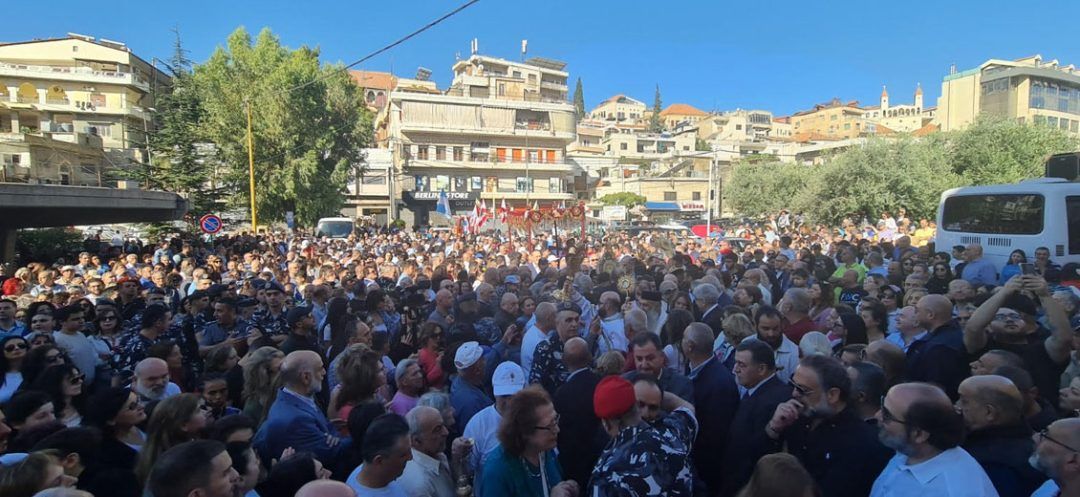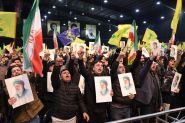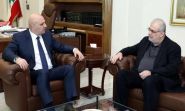
For the Christians of Lebanon and for Lebanon as a whole, the presidential vacancy is "worse than the plague." It jeopardizes the future of the Lebanese "political entity," stated the Greek-Catholic Archbishop of Zahle, Ibrahim Ibrahim, during the Feast of Corpus Christi, which the city has faithfully commemorated since 1825, nearly two centuries ago. That year, a procession of the Blessed Sacrament miraculously saved Zahle from a plague epidemic.
"With the fervor of the early days, we pray that God heals our beloved homeland from an illness even more malignant than the plague, an illness that gnaws at its entity and its unique formula," declared archbishop Ibrahim Ibrahim, speaking alongside the Greek-Catholic Patriarch, Youssef Absi. A surprise guest at this commemoration, Patriarch Absi delivered a speech purely religious in nature.
By coincidence, the cry of the Archbishop of Zahle echoed — unintentionally — the warning issued the previous day by Jean-Yves Le Drian, the personal envoy of the French President Emmanuel Macron to Lebanon, after another unsuccessful mediation: If a president is not elected as soon as possible, it could mean "the end of political Lebanon," declared the former French Foreign Minister, noting that Lebanon has been without a president since the end of the term of former President Michel Aoun in October 2022.
Addressing the faithful gathered in front of the Serail building, Archbishop Ibrahim emphasized that the absence of a president jeopardizes not just a function but "the entire Christian presence in Lebanon" and "the very destiny of the homeland."
In this regard, he added, "We must consider it a national duty to provide unwavering support to the Lebanese army and security forces as an irreplaceable instrument of internal security and stability." The Army Commander, General Joseph Aoun, is one of the three serious candidates for the presidency.
The Archbishop of Zahle also defended the principle of the inviolability of bank deposits, called for an equitable distribution of high state positions among all communities, and requested that the Feast of Corpus Christi "be officially declared a public holiday in Zahle."
The capital of the Bekaa, a city with 52 churches, considers itself a "eucharistic city" since, two centuries ago, in 1825, following a vision, its archbishop Aghnatios Ajoury managed to organize a procession of the Blessed Sacrament in its streets, saving it from a plague epidemic ravaging the region.
"This miracle is a historical event that has marked the general consciousness of the Zahle residents," explains Georges Okaïs, the Greek-Catholic deputy of the Lebanese Forces in the area, present at the procession. "The festival is part of our spiritual heritage. Without it, Zahle would lose part of its identity."
Founded in the 16th century, the city has always had its own personality. With its 120,000 inhabitants, it is the largest purely Christian agglomeration in the Arab world. Located on the edge of the Bekaa plain, it gained importance in the 18th century by becoming a railway hub and a center for agricultural and merchandise transactions between Beirut, Damascus, and the hinterland.
The Greek-Catholic bishop of Zahle traditionally plays a unifying role. Having the ear of the great families, he has a say in the city's affairs while being a church leader.
The Feast of Corpus Christi in Zahle is marked by separate processions from all the city's churches, both Catholic and Orthodox, a unique feature in Lebanon. Starting at dawn, these distinct processions converge towards the Serail before spreading out with their monstrances to all the city's neighborhoods. This brings great joy to the faithful of all ages who gather individually or in organized groups (brotherhoods, schools, scout troops, Caritas volunteers, neighborhood bands, etc.), as well as the residents who await the processions' passage on their balconies or next to their altars.
The day begins at dawn in a joyous atmosphere and concludes with a final mass and, for those fasting, the first coffee. Broadcast live on Facebook by Zahle TV and closely followed by the large Greek-Catholic diasporas in Brazil and Canada, this day unites people and brings them together.
"To belong is to follow in the footsteps of those who came before us, to create our own history, to forge our identity," recalls Nevine Hajj-Chahine, a historian married to a Zahle resident. "Somewhere in this stream of secularization, we realize that the world is once again ordered to a higher order, and I find that wonderful," she rejoices. The city reopened after the ceremony concluded around noon.
Read more



Comments